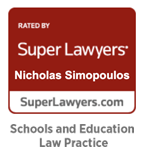YOUR RIGHT to receive an education AND benefit FROM our NATION’S educational institutions IS FUNDAMENTAL – PROTECT AND DEFEND THAT RIGHT.
Indeed, an education not only prepares a person for his or her social interactions throughout life, but it also provides the tools to pursue a meaningful calling. Fundamentally, a person has a right to receive an education and benefit from academic institutions and programs and free from unlawful influences, including discrimination and harassment on the basis of race, color, national origin, sex, disability, or age. A person also has right the right to due process and to be treated fairly in academic proceedings, including with respect to disciplinary and misconduct charges. A person should have the comfort of knowing his or her school is acting not only in the way the law requires but also in the way the school itself has promised it will act, including through its own policies, procedures, and contractual obligations.
Unfortunately, many schools break their promises. And discrimination still exists today, whether overt or subtle, and it has the ability to affect a person’s education and life permanently. In many cases, discrimination and accompanying harassment, whether by faculty or other students, can have a devastating impact on a person. As a Virginia education law firm, we make it our mission to ensure that schools, colleges, and universities are in compliance with their legal obligations and providing a legal and safe environment. When an educational institution fails or simply refuses to meet its obligations, then our objective is to step in and protect the rights of those students affected. That is what we do.
A school’s obligations to students arise under various federal AND STATE laws, including but not limited to:
- Title VI of the Civil Rights Act of 1964, which prohibits discrimination on the bases of race, color, and national origin
- Title IX of the Education Amendments of 1972, which prohibits discrimination based upon sex, including during admissions, grading, sexual assault and harassment investigations, misconduct hearings, and other disciplinary proceedings
- Titles II and III of the Americans with Disabilities Act of 1990, which prohibit discrimination based upon disability at, respectively, public and private schools and institutions and also guarantee reasonable accommodations in education
- The Age Discrimination Act of 1975, which prohibits age discrimination,
- The Due Process Clause of the Fourteenth Amendment, which guarantees students and others due process of law, and
- The Virginia Human Rights Act, which prohibits discrimination at educational institutions.
Of course, this list of legal obligations on an educational institution is not exhaustive. Depending upon the circumstances, a student may also have other freedoms and protections, such as a freedom of speech under the First Amendment or to be free from bullying or other forms of conduct in violation of Virginia laws. Ensuring representation by an attorney who is experienced and well-versed in the highly-specialized area of education law is a first and critical step to safeguarding rights in academia.
Simopoulos Law has nearly two decades of state and federal experience and has handled complex and high-profile education law cases and matters involving Title IX, discrimination, harassment, hazing, and bullying at educational institutions. We know that such discrimination and harassment can occur at any time in an educational experience, from the date of a first application for admission all the way to graduation day itself. Having been in the trenches with schools, colleges, and institutions for many years and served as an adjunct professor at the country’s oldest law school, William and Mary, Simopoulos Law possesses the unique experience and insight to assess and address educational issues that can and do arise.
Because Simopoulos Law is well-versed in education litigation, the firm also has a unique insight on what can go right and wrong at an academic situation even before litigation arises. Simopoulos Law regularly works with students throughout Virginia in difficult situations in order to avoid protracted litigation, whenever possible, and achieve the best possible outcome as promptly as possible for its clients.
Simopoulos Law regularly provides EDUCATION LAW advice, counseling, and representation to students in academic contexts, including:
- General Education Law Advice and Representation
- General Student Defense and Rights Advice and Representation
- Title IX Hearings and Proceedings
- Academic Hearings and Proceedings
- Student Discipline and Misconduct Hearing and Proceedings
- Student Suspension and Expulsion Defense
- Code of Conduct and Honor Code Hearings and Proceedings
- Academic Accommodations
- Academic Grievances, Hearings, and Investigations
- Grade Disputes and Appeals
- Records Requests under FOIA and FERPA
- Tuition Disputes
- IEPs, Due Process Hearings, and Special Education
Simopoulos Law focuses a significant part of its practice on education law in order to help students, who represent the future of this country. Being a Virginia education lawyer is our passion and it shows in our representation, as we have successfully helped many students in their most difficult times. If you think for any reason you may be experiencing unlawful conduct by another at school, a college, or a university, and it is affecting your ability or the ability of somebody you love to receive an education, then please contact us right away for a consultation.


